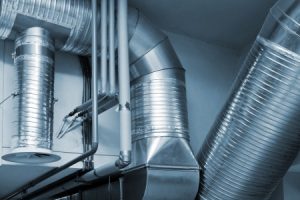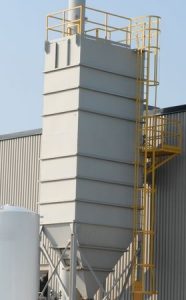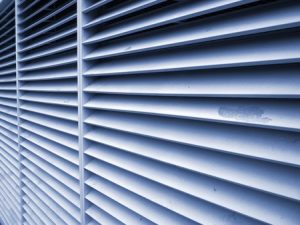Ventilation systems are incredibly important for industrial facilities. Not only do they help clean the air, they help protect the people that work inside. With many industrial sites working with potentially harmful chemicals or needing to keep air flow carefully controlled to protect chemical reactions or food production, it is absolutely critical that the ventilation equipment works well to keep everyone protected.
Top-of-the-line ventilation systems, though, involve more than just supply and exhaust fans. There are many components and stainless steel sheet metal duct installations that all must work together to ensure that industrial buildings are properly ventilated at all times.
 Ventilation Components
Ventilation Components
Fans
Having fans is mandatory, but many buildings do not put in enough fans. It’s not enough for businesses to buy one they think is big enough, but they must actually do the calculations to make sure the air flow in the building is acceptable. Beyond air flow concerns, fans also must regulate pressure inside the building, and failing to take that into account can have horrible results. Fans come in a number of configurations and shapes to maximize performance, which means that the type of building you need to ventilate plays an important part in designing a fan system for your business. A reputable sales engineer from R.G. Smith Company can help you determine the best layout for your business and answer any questions you may have.
Louvers
These act as a great way for industrial sites that want ventilation with a powered exhaust system, but need to be able to adjust flow of air depending on external elements. With their unique shape and design, louvers allow in air, but keep outside rain, dust or insects out. Louvers can be installed at either the intake section or exhaust section of a ventilation system, and are typically designed to be installed vertically in a wall.
Dampers
These perform a different function from louvers, although they may look the same from the outside. Dampers can open and close, allowing airflow to be more regulated and controlled. This means that if you need to dramatically increase ventilation, dampers can be opened fully or, conversely, closed off to restrict airflow from during an emergency situation or hazardous ventilation that you don’t want to let seep into the regular circulation.
Silencers
Industrial buildings can be loud, so to help keep workers comfortable and lower individual stress, company owners usually install silencers. Silencers offer relief from the noise created from the machines, and are often required by law if the noise from your ventilation machinery exceeds a certain volume.
Air Filters
While air ventilation systems circulate the air, filters work to remove harmful particles out of the air. Air filers can strain out pollen, pollutants and other particulate matter that may be airborne while allowing cleaned air to pass through them.
 Dust Collectors
Dust Collectors
Similar to air filters, dust collectors focus specifically on removing the dust in the air. They are more heavy duty than air filters, generally, and often removes contaminants through a vacuum system that then recirculates the air back outside. This is incredibly handy for buildings that create a lot of sawdust or even metal particles during manufacturing processes.
Dehumidifiers
The air can get filled with moisture, especially in the summer months when heat rises and more evaporated moisture is in the air. Dehumidifiers help remove this excess moisture from the air in a contained industrial space. This is especially helpful in protecting equipment that may be sensitive to moisture, plus reducing humidity levels will allow you and your employees to work more comfortably.
Specialized Industrial Applications
All of these ventilation tactics can help industrial buildings improve air quality and circulation rates while increasing employee satisfaction and safety. While all of these products make up a good ventilation system, company owners must also take into special account the specific work being done in their building. Here are a few different types of work that require special considerations.
Chemical Plants
Special consideration needs to be given to the chemicals being manufactured at your business and whether special materials should be used. If a chemical is potentially explosive, consider using fans with non-sparking construction and explosion-proof motors.
 Painting Facilities
Painting Facilities
In businesses that work with spray painting or paint coating items, the ventilation system must be designed in a way where it is easy to open the fan to clean the internal parts. Airborne paint particles can accumulate and cause contamination across projects if the system is improperly designed. These buildings must also use specialized ventilation to and from curing ovens to remove excessive heat while still circulating dry air that can remove the moisture from the wet paint.
Metal Foundries
These facilities get very hot in a short amount of time – not a surprise, considering the incredibly high melting temperatures of metals. Most facilities have openings through which hot air can escape, but this is generally insufficient. Foundries often need to add additional roof and wall ventilation in the smelting area that can be constantly run at all times that metal work is being done to the heat down and operations safe.
Food and Beverage Manufacturing
There are two specialized requirements for ventilation needed for food processing plants. The first is a system that regulates the air intake, filtering it extensively to ensure that the supplied air remains contaminant free. The air circulation system must also create a positive pressure so that when a door is opened, the air flows outward instead of in. These buildings tend to have a lot of moisture as a result of manufacturing, which is why using a stainless steel or aluminum construction is best.
At R.G. Smith Company, we’ve helped design and install industrial ventilation solutions for businesses in a wide range of industries and operations large and small. Our experts can consult with you on the requirements at your specific location to determine your exact needs, identify any potential obstacles to installation, and work with you from start to finish. As sheet metal fabrication and design professionals, we can create custom components for your facility or provide you with any guidance you may need.
To learn more or to get started, give us a call today in Canton at 330-456-3415 or at our Mansfield location at 419-524-4778.




Leave a Reply